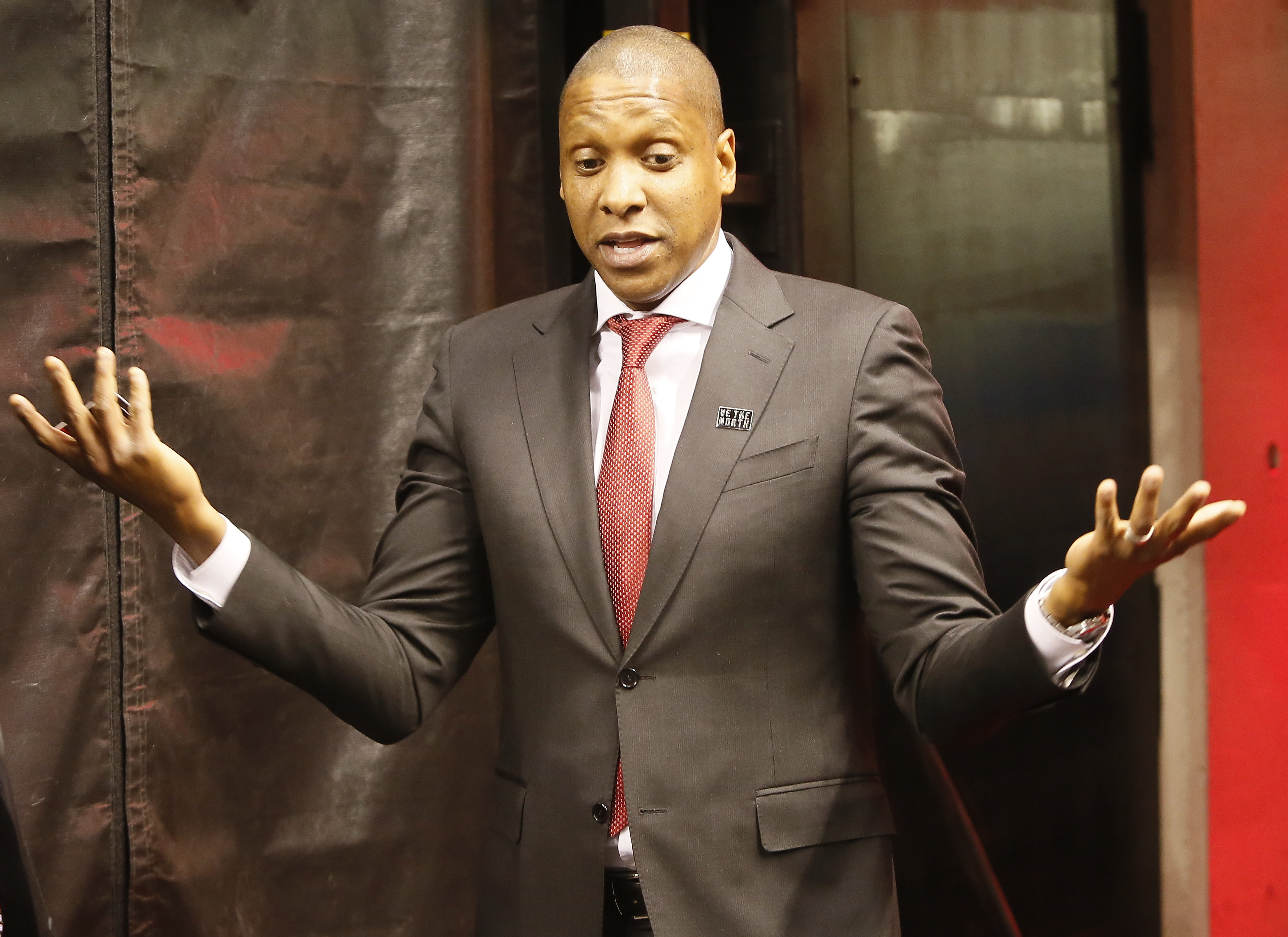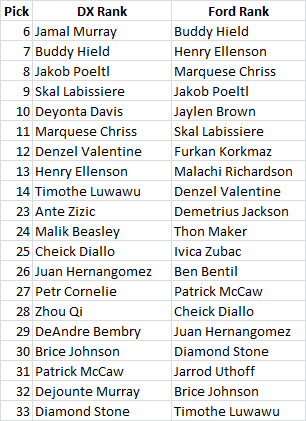By the grace of James Dolan and Andrea Bargnani, the Toronto Raptors will select 9th overall in the 2016 NBA Draft.
The NBA held its annual draft lottery on Tuesday, determining a top-three order of Philadelphia, Los Angeles (Lakers), and Boston. That meant that Toronto, who was owed the lesser of Denver or New York’s first-round pick, will receive the No. 9 pick, with Denver landing the No. 7 pick.
The Raptors had no chance at No. 1 (because of Denver’s right to choose) but had a 1-in-593 chance at the No. 2 pick, a slightly better chance at the No. 3 pick, and the potential to pick at Nos. 2, 3, 8, 9 (most likely at 79.2 percent), 10, 11, or 12. This was all explained in more detail here and here
And of course, it all goes back to this: The Raptors landed a first-round pick for Bargnani, Masai Ujiri’s first major move just six weeks into his tenure. As I wrote in November (please go back and read that whole thing, it’s so much fun here on lottery night):
On May 31, 2013, the Toronto Raptors hired Masai Ujiri as the team’s new general manager. It took him all of six weeks to expunge the cardinal memory of the previous regime.
…
To date, Bargnani ranks 50th among 69 No. 1 overall picks in total career win shares and 56th in win shares per-48 minutes. The Raptors whiffed, with Bargnani failing to ever live up to his potential as a versatile, high-efficiency offensive weapon capable of at least protecting a rim on defense. He showed flashes of potential, even for long stretches, nearly earning an All-Star appearance at one point (no one man should have all that pasta). He hasn’t even turned out a bad NBA player, as he’s now in his 10th season and has averaged 15 points at near league-average offensive efficiency. But “capable one-way bench contributor” is not the preferred outcome for a top pick, and Bargnani ranks 11th from his draft class in total win shares (and 27th on a per-minute basis).
…
Bargnani’s development continued on an uneven path. With a larger workload in 2009-10, his numbers improved slightly. 2010-11 was his “breakout” season, as he averaged 21.4 points, but his scoring efficiency cratered, his shot-blocking vanished, and he became even less of a rumor on the glass. Save for the famous “13-game stretch,” there was serious cause for concern. Things got worse in an injury-plagued 2011-12 season (he began to pass more willingly and got to the line a lot more, but he shot terribly and his defense was woeful), which was followed by an injury-plagued 2012-13 campaign.Enter Ujiri and the New York Knicks.
On July 10, 2013, the Raptors flipped Bargnani and the $23.4 million owed to him over two years to the Knicks. The return was small in on-court terms: A deep reserve in Steve Novak, a retiring Quentin Richardson, and a bought-out Marcus Camby. But the Raptors also landed a 2014 second-round pick (originally from the Thunder and later sold to Brooklyn, it was No. 59 and became Xavier Thames), a 2017 second-round pick (later sent to Utah to unload Novak for Diante Garrett), and a 2016 first-round pick.
It’s now the 2015-16 season, which means that first-round pick – which, again, the Raptors received for two years of an overpaid, injury-plagued disappointment – will convey this summer. The 2016 NBA Draft isn’t expected to be a great one, but in a rising salary cap environment, the relative value of players on rookie scale contracts is significant. If the salary cap jumps as expected, next year’s No. 1 pick would take up 6.6 percent of his team’s salary cap instead of the 8.2 percent Karl-Anthony Towns is taking up this season (these figures assume the standard 120 percent of rookie scale). The No. 20 pick will take up less than two percent of a team’s cap space. Static rookie salaries in a rising cap environment make hitting on a pick this year (and the last two) even more valuable in the short-term than normal.
Ujiri represented the Raptors on the lottery floor, with Dan Tolzman in the lottery room, which seemed quite fitting. I personally would have had Bargnani on the stage, though.
#TakeThatMasaiUjiri pic.twitter.com/G1eqtGchCi
— charlie widdoes (@charliewiddoes) May 17, 2016
The Raptors also own their own first-round pick, No. 27 overall. Their second-round pick is owed to Memphis to complete the Hedo Turkoglu trade.
Here’s who Draft Express and Chad Ford have ranked players in the ranges Toronto will pick, assuming they don’t move one or both of the selections (which I’d imagine is entirely on the table, even if it’s a case where the Raptors make the pick but don’t officially trade it until after the moratorium ends in July).
As a reminder, it’s a little early for me this year to rank players myself. I dipped in to college for a lot of March, but I generally watch a bunch more video/do more reading after the season ends. We’ll be a little compressed for time this time out, given the Raptors’ extended playoff run, but I’ll try ti pivot quickly to draft stuff once the playoffs are over.
To paint with broad strokes, I’m very much in the Best Player Available Camp, with some limits. I just think rosters are too fluid and rookies contribute to little in year one (in most cases) to plan out a roster or use a draft asset based on how things look this second. Delon Wright looked like he filled a need at the time, and not everyone is going to be able to play on a 50-plus-win team as a freshman like Norman Powell. I think if the Raptors keep a pick, they’ll lean more toward the Wright/Powell ready-sooner type, given where they are as an organization right now, and a draft-and-stash wouldn’t surprise me in the least, considering the roster stands to have a few young players on it again next season.
No matter how it shakes out, this extra pick is so much bonus fun for this coming offseason. Thanks, Bargs!




